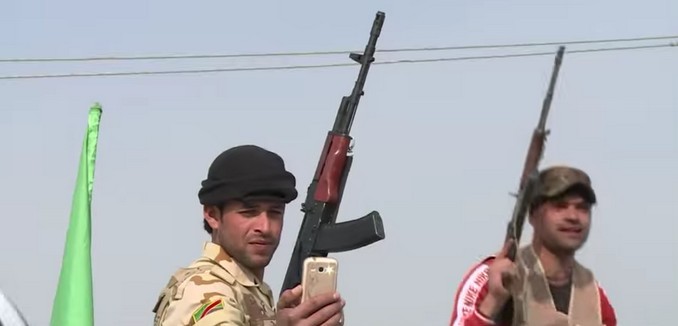Iran is making the American fight against the Islamic State of Iraq and Syria (ISIS) even harder, according to an analysis published today by Michael Weiss and Michael Pregent for The Daily Beast. The analysis notes that Pregent, when he recently briefed American military advisors who were heading to Iraq, told them that “Iranian and Shia-militia targeting choices” would have priority even over American military and intelligence officials.
The consequence of this tacit collaboration with the Quds Force and its assets is obvious: the United States will be portrayed by ISIS propagandists as a helpmeet in the indiscriminate murder and dispossession of Sunnis. …
The Anbar Awakening critical to stabilizing Iraq in the middle of the last decade was made possible by the presence of U.S. ground forces who represented to the influential Sunni tribes an impartial bulwark against the draconian rule of al Qaeda in Iraq.
Many in the Obama administration express the hope that another such awakening can be fomented, given the current political and military dynamics in Iraq. But how? ISIS has cleverly exploited the sensitivities and fears of Iraq’s Sunni tribes, offering those it hasn’t rounded up and murdered the chance to “repent” and reconcile with the so-called “Calihpate.”
Weiss and Pregent observed that many Sunni tribesmen, who have fought ISIS, are now being killed by their fellow tribe members who have embraced ISIS giving the Sunnis “a choice between cutting a pragmatic deal with ISIS or embracing Shia death squads as their saviors and liberators.”
Weiss and Pregent quote a few Iraqi Shiite politicians who are uncomfortable with the Iranian involvement in their internal strife and fear that it will lead to only greater bloodshed.
This analysis follows the massacre of over 70 Sunni men in a village in eastern Iraq last week by Shiite militias.
In How Iraq Became a Proxy of the Islamic Republic of Iran, which was published in the December 2014 issue of The Tower Magazine, Jonathan Spyer and Aymenn Jawad Al-Tamimi explained that Iran views its operations in Iraq as a success. Furthermore they observe that this success encourages Iran to expand its influence all around the Middle East.
The growing importance of the Shia militias’ resistance to the I.S. in Iraq is not simply the result of their own combat skills. It is very much a product of the Iranian Revolutionary Guard Corps (IRGC), the Iranian regime’s elite paramilitary force, whose role in regional conflicts—and, it should be noted, terrorism—is large and expanding. The Shia’s success in Iraq reflects the effectiveness of IRGC doctrine regarding the construction, support, and use of sectarian political and military proxies as a central tool—sometimes the central tool—of Iranian policy in the region.
Iran has displayed a peerless ability to harness and utilize forces of this kind in the Middle East. It is a major factor in Iran’s ongoing success in building political influence in surrounding countries.
[Photo: AFP News Agency / YouTube ]




